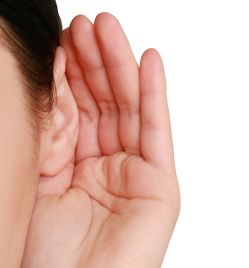
What Does Listening Have To Do with Public Speaking?
Everything!
Let?s say that you and I just met at a networking event or business conference.
You ask me a simple question (the New York standard is, ?So, what do?you do??) and I launch into a 10-minute exposition:
I tell you about my successful speaker coaching business. I tell you about my wonderful public speaking clients. I tell you about how I built the business from nothing starting in 2003 and then had to rebuild it after the economic crash in 2008. I tell you about my new book and how much it?s helping people. I tell you that I?m booked to give three keynote speeches in the next three months for audiences that range from women engineers to creative freelancers. I tell you that?
Are you impressed with me?
I don?t think so. I think it?s more likely that you want to?strangle?me.
You sure won?t be hiring me as a public speaking coach, because I?ve just demonstrated that I don?t know how to?communicate.
Not Listening is a Big Mistake
We all tend to listen?less?when we?re nervous or under stress (and I say that with all humility, because I?ve done it, too!)
But in fact, what we need to do is listen?more.?Only by listening can we discover:
- Who we?re talking to;
- What?they?find of interest or importance; and
- Whether our interests overlap with theirs.
Now, if you?never?do anything but listen to others ? women, introverts, shy guys, I?m talking to you!! ? ignore this advice.
Instead, work on making strong, proactive statements about yourself, your business, and your successes.
But if you often find yourself monopolizing the floor, practice stopping?at the end of your current thought. (The best way to do this is to just shut your mouth; seriously.)
Or you can use my favorite technique, the self-deprecating trail-off, which goes:
And then I told him that if we didn?t get more people signed up before July 14th, I was going to? ?oh, you know, blah-blah-blah.
For Great Public Speaking, Stop, Look, and Listen
 You may have been told as a child, to?stop, look, and listen?for traffic?before you step off a curb into the street.
You may have been told as a child, to?stop, look, and listen?for traffic?before you step off a curb into the street.
That?s also good advice for public speaking.
STOP. ?One big difference between introverts and extraverts is how quick we are to jump into speech.
This isn?t a matter of social skill, but a reflection of the fact that, for extraverts, thoughts are most real when they?re spoken out loud; whereas introverts like to hold our ideas close.
Whichever of those preferences you favor, a slight pause before you jump in will give you a chance to assess the other person ? and maybe find out that they want to speak first!
LOOK.?In mainstream U.S. culture, we signal our interest in another person by making eye contact.
As a bonus, when you?re looking carefully, it?s easier to pick up information ? such as whether or not the other person is interested in what you?re saying ? that makes the conversation go better.
If you?re very shy, or were raised in a culture where direct eye contact is considered rude, this can be really hard.?But the truth is that?all?of us can get better at making eye contact by practicing a little bit here and there.
Just remember: Your goal with eye contact is to actually observe?the other person, not to hit them with a frozen, wooden stare.
LISTEN. This one is tough enough to get its own section:
You Can Listen More Effectively (We All Can!)
Listening is really hard work ? as any audience member will tell you ? but it?s also a skill, like any other, that can be developed in small increments.
Here are some tricks that will help you listen better:
1. Quiet your own internal voice.
 Most of us have (to quote presidential speechwriter William Safire) a nattering nabob of negativity?in our brains ? a voice that delights in telling us that we?re not good enough, smart enough, thin enough, blah-blah-blah.
Most of us have (to quote presidential speechwriter William Safire) a nattering nabob of negativity?in our brains ? a voice that delights in telling us that we?re not good enough, smart enough, thin enough, blah-blah-blah.
Buddhists call this internal chatter?monkey mind.?Freud called it your?superego.?In my book on public speaking,?Speak Like Yourself? No, Really!,?I call it your?nasty little self-critical voice.
It can be very hard to hear other people when that voice is jabbering at you.
So?try to ignore it, by any means necessary, and concentrate on?what the person you?re talking to is saying.
To help you do this?
2. Silently repeat what the other person says
I find it helps me to focus if I silently repeat what I?m hearing; for example:
She works in finance. She does some kind of research. She?s bored with her job and wants to find a new one with more responsibility?
In a business meeting or other ?situation where you?must?retain what?s being said, you may also want to state what you heard and get confirmation:
Tell me if I?m hearing you correctly: You said that if we don?t re-do this campaign from top to bottom, at our own expense, you?ll take your account to another agency?
In addition, you can?
3. Take notes.
Whether it?s jotting down a few phrases on someone?s business card (?tall, wearing grey shirt, met at Levin Institute?) or writing down what was actually said, taking notes can also concentrate your mind and make it easier to listen.
To say nothing of reminding you, later on, what was said!
You Can Listen to Audiences, Too!
Stopping, looking, and listening before you speak can help you structure a conversation that?s a real?exchange,?and connects you to another person.
But for public speakers, it doesn?t end there. We also need to listen to our?audiences?? and in Tip 13, I?ll show you how!
Source: http://speakupforsuccess.com/6878/public-speaking-tip-12-listen1/
spring equinox audacious pollen count mexico city first day of spring mexico earthquake aziz ansari
No comments:
Post a Comment
Note: Only a member of this blog may post a comment.